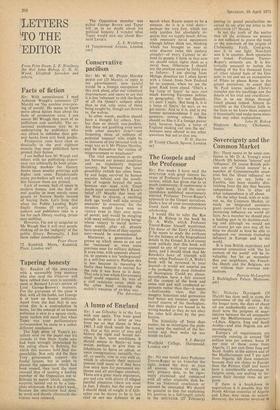Conservative pacifism
Sir: Mr W. M. Phipps, Hornby points out (20 March), in reply to my advertisement, how hateful would be a foreign occupation if this took place, after our voluntary disarmament; and seems to say that it is less 'inhuman' to risk the death of all the Queen's subjects alike than to risk only some of them being caught by, though not thrown to, the wolves.
In other words, pacifists should have a thought for others. Yes: but then so should non-pacifists. Are these not gambling even more with other people's lives?—not forgetting those of millions of , potential 'enemies' who might he as innocent of any personal wish to wage war as is Mr Phipps Hornby, and be themselves the victims of misgovernment or mischance?
The vital comparison is surely not between our present condition and an impudently imposed tyranny, but between the latter possibility (which has often been, by and large, survived by human societies before) and the possib- ility of tragedy beyond the scale humans can cope with. Great doubt must surround Mr J. Kane's belief (27 March) that were all the West to disarm, a resulting dark age 'could well take several centuries' to overcome, for the invaders would have won no victory even in their own terms of power, and would be mingling with many millions of living beings whose victory in moral terms— they would, after all, already have saved the lives of their oppres- sors--would be unprecedented.
Moreover, a generation has grown up which seems as cut out for 'resistance' as were some previous ones for military defence. It even tries, with apparent absurd- ity, to operate a toy 'underground' in a still-free country. Perhaps this is less because its reasoning is faulty than because its instinct for the role it was born to is deep. That role is one which Government itself could organise, by way of a civil resistance corps, while on the other hand resisning the nation's weapons of en-bloc war.
The Advertiser










































 Previous page
Previous page